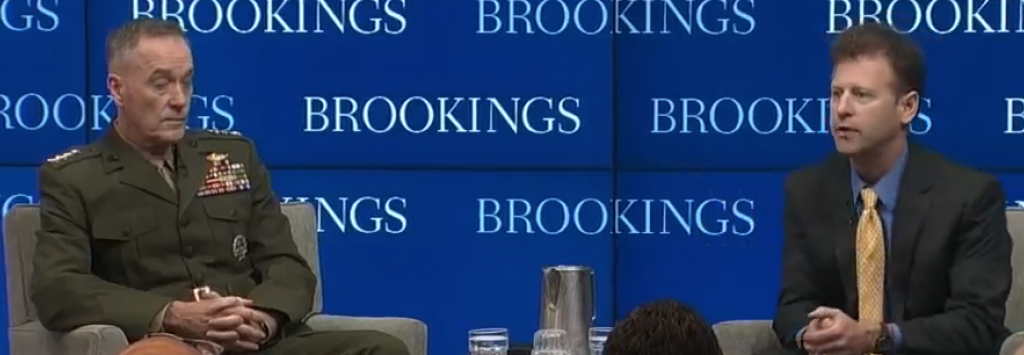Speaker: General Joseph F. Dunford (Chairman, Joint Chiefs of Staff)
Moderator: Michael E. O’Hanlon (Senior Fellow, Foreign Policy)
On Thursday, February 23, 2017, the Brookings Institute hosted General Joseph F. Dunford to discuss the dangerous security environment regarding benchmarking military’s planning, capability development and an assessment of risk against the challenges posed by Russia, China, North Korea, Iran and violent extremism.
General Joseph F. Dunford states that last year the administration was trying to decide what the priorities should be and assess the risks that are in current view. The biggest challenges that the Chairman identifies are those of dealing with what he calls the “four plus one (4+1)”: Russia, China, North Korea, Iran and violent extremism. The General sustains that the 4+1 do not bring the risk of an armed conflict in the near future, but that the US should have the capabilities to protect itself regardless.
The General puts his ideas in perspective by exemplifying Russia and how the state has modernized its nuclear enterprise as well as cyber-structure, sea and space capabilities. There are also operational paradigms that the speaker did not see since 1980’s regarding where Russia is deploying. He believes that the US has a competitive advantage upon them, in particular through NATO, which is why Russia operates underneath threshold of conflict, where they have an informational war, economic war, and political influence. Russia is seeking to undermine the ability of NATO to fight them. The implications of the developments are that NATO will not be able to operate and move around NATO.
Dunford sustains that China has the same type of capabilities. Tracking Chinese investments is a big vaguer. There are barriers to keeping the US from operating in the Pacific. Iran has the same issues although more detailed. More recently in N. Korea, you can see that they are developing intercontinental ballistic missile as well as nuclear warheads. The General argues that when one looks look at the implications, there is a need to focus on all the areas. The 4+1 takes all of them into consideration. When he looks at those challenges:
Any conflict would be involved in all the lanes, sea space land air, and it would be transregional.
He expresses that the United States is reaffirming its commitment to NATO and Article 5. He meets with all leading defense counterparts as a group once. He further underlines the US’s determination for every member nation to meet the 2% GDP commitment. Make sure that NATO continues to transform to be relevant to the security challenges we meet today and tomorrow, such as immigration and terrorist attacks.
Regarding NATO enlargement and the ability of the smaller countries such as Montenegro to contribute their share towards the defense budget, the General emphasized that the administration made it clear that all members of the alliance need to contribute equally towards the burden.
His take is that Montenegro is spending 2% of the GDP. The US represents the larger contributor to NATO, and they are the backbone.
If General Dunford were to add another threat to US national security above the 4+1, he would add that of the economy. He believes that the US capabilities and capacities are linked to the strength of the economy, exemplifying it as solvency. If the state has a strong economy, it is capable of restraining its enemies.
Synthesis by: Patricia Besciu – all opinions are those of the speaker. No personal ideas have been included.
For more information visit: https://www.brookings.edu/blog/brookings-now/2017/02/24/joint-chiefs-chairman-dunford-transnational-threats/
